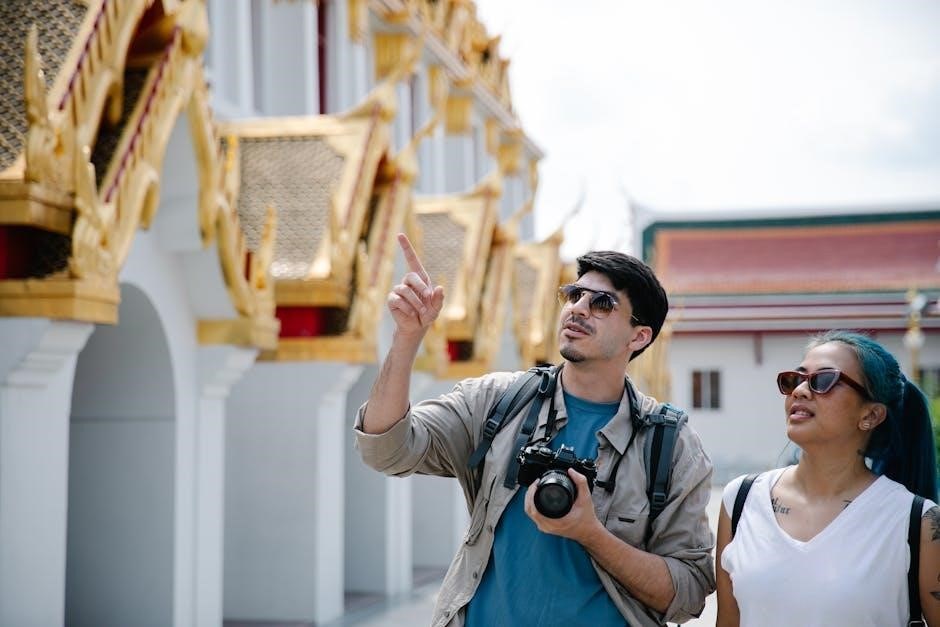sex tourism guide
Sex tourism involves traveling specifically for sexual activities‚ often to countries where prostitution is legal‚ encompassing both transactional and non-transactional encounters. It raises ethical concerns‚ including human trafficking risks.
1.1 Definition and Scope of Sex Tourism
Sex tourism is defined as travel planned specifically for sexual activities‚ often to countries where prostitution is legal. It encompasses both transactional encounters with commercial sex workers and non-transactional sexual experiences. The scope of sex tourism varies widely‚ ranging from organized tours to individual endeavors. While some engage in consensual practices‚ the industry is often linked to ethical concerns‚ including exploitation and human trafficking. This phenomenon has grown in popularity‚ with destinations worldwide catering to diverse sexual preferences and experiences.
1.2 Historical Context of Sex Tourism
Sex tourism has ancient roots‚ with evidence of travel for sexual purposes traced back to early civilizations. The practice evolved over centuries‚ influenced by colonialism‚ globalization‚ and shifting societal norms. In the 15th century‚ European explorers encountered diverse sexual cultures‚ laying the groundwork for modern sex tourism. By the 20th century‚ post-WWII economic growth and international travel boom further popularized the phenomenon. Today‚ it remains a controversial yet persistent aspect of global tourism‚ often tied to ethical debates and exploitation concerns.
1.3 The Global Sex Tourism Industry: An Overview
The global sex tourism industry is a multibillion-dollar market‚ spanning continents and catering to diverse preferences. Destinations like Brazil‚ Thailand‚ and the Netherlands are hubs due to legal frameworks. The internet and social media have fueled its growth‚ enabling discreet bookings and reviews. Despite its economic benefits‚ the industry faces criticism for exploiting vulnerable populations‚ often linked to human trafficking. Efforts to regulate and raise awareness continue‚ but the clandestine nature of the trade complicates enforcement and ethical reforms.

Popular Destinations for Sex Tourism
Thailand‚ Brazil‚ and the Netherlands are top destinations‚ known for their vibrant nightlife and liberal attitudes toward adult entertainment‚ attracting millions annually.
2.1 Top Countries Known for Sex Tourism
Thailand‚ Brazil‚ and the Netherlands are among the most popular destinations for sex tourism. Thailand is renowned for its vibrant nightlife and red-light districts in cities like Bangkok and Pattaya. Brazil attracts visitors with its Carnival festivals and liberal attitudes‚ while the Netherlands is famous for its legalized prostitution and tolerance of adult entertainment. These countries offer diverse experiences‚ catering to a wide range of preferences and cultural interests‚ making them global hotspots for sex tourism.

2.2 Regional Hotspots: Asia‚ Europe‚ and the Americas
Asia is a major hub‚ with countries like Cambodia and the Philippines gaining prominence alongside Thailand. Europe’s sex tourism scene thrives in Germany and Spain‚ known for their liberal attitudes and organized adult entertainment. In the Americas‚ Mexico and Costa Rica attract visitors seeking affordable and discreet experiences. These regions cater to diverse preferences‚ blending local culture with tourism‚ making them popular choices for those exploring sex tourism globally.
2.3 Emerging Destinations in Africa and the Middle East
Africa and the Middle East are witnessing a rise in sex tourism‚ with countries like South Africa and Kenya gaining attention for their vibrant nightlife and diverse cultural offerings. In the Middle East‚ Dubai’s luxury and anonymity appeal to some travelers. These regions blend unique cultural experiences with growing tourism infrastructure‚ making them attractive alternatives to traditional destinations. However‚ legal restrictions and social norms vary widely‚ influencing the industry’s growth and visibility in these areas.

Legal and Ethical Considerations
Sex tourism raises complex legal and moral questions‚ with varying laws globally and debates on exploitation versus consent. Understanding these issues is crucial for informed decision-making.
3.1 Legal Status of Prostitution Worldwide
Prostitution laws vary globally‚ with some countries legalizing and regulating it‚ while others criminalize it. Nations like the Netherlands and Germany have legalized prostitution‚ ensuring safety and taxation. In contrast‚ Sweden follows the Nordic model‚ criminalizing the purchase but not the sale of sex. Many countries maintain illegal status‚ driving the industry underground. Regional differences exist‚ even within nations‚ like the U;S.‚ where only certain areas permit brothels. These legal frameworks significantly influence sex tourism patterns and risks.
3.2 Ethical Debates: Exploitation vs. Consensual Practices
The ethics of sex tourism spark intense debate‚ with arguments centered on exploitation versus consensual practices. Proponents argue that consensual sex work can empower individuals and provide economic opportunities. Critics‚ however‚ highlight systemic exploitation‚ particularly of marginalized groups. Power imbalances and coercion often blur the line between consent and exploitation. Ethical concerns also arise from human trafficking and the objectification of individuals. These debates underscore the complexity of distinguishing between voluntary and exploitative practices in the sex tourism industry.
3.3 Human Trafficking and Its Link to Sex Tourism
Human trafficking is a critical issue intertwined with sex tourism‚ often involving the exploitation of vulnerable individuals. Traffickers exploit power imbalances‚ targeting marginalized groups like women and children. Many victims are lured with false promises of employment‚ only to be forced into sex work. The anonymity of tourism environments facilitates trafficking‚ making it difficult to track and prosecute offenders. Addressing this issue requires global cooperation and stricter enforcement of anti-trafficking laws to protect victims and hold perpetrators accountable.

Health and Safety Tips
Sex tourism poses health risks‚ including STIs. Prioritize safe sex practices‚ use protection‚ and stay informed about local medical resources to ensure personal well-being while traveling.
4.1 Risks of Sexually Transmitted Infections (STIs)

Engaging in sex tourism significantly increases the risk of contracting STIs due to multiple sexual encounters and inconsistent condom use. Common infections include chlamydia‚ gonorrhea‚ HIV‚ and herpes. Travelers must prioritize protection‚ use condoms‚ and avoid risky behaviors. Pre-exposure prophylaxis (PrEP) and regular testing are crucial preventive measures. Understanding local healthcare access is also vital to address potential infections promptly and effectively during or after the trip.
4.2 Importance of Safe Sex Practices
Safe sex practices are essential to minimize health risks during sex tourism. Using condoms consistently reduces the risk of STIs and unintended pregnancies. Limiting the number of sexual partners and avoiding unprotected encounters further lowers risks. Open communication with partners about sexual history and preferences is crucial. Regular testing before and after trips ensures early detection of infections. Prioritizing protection and respect for all parties involved promotes a safer and more responsible experience for everyone.
4.3 Vaccinations and Medical Precautions for Travelers
Travelers engaging in sex tourism should prioritize vaccinations and medical precautions. Hepatitis A‚ Hepatitis B‚ and Typhoid shots are often recommended. Consult a healthcare provider to ensure all vaccinations are up to date. Carry essential medications‚ including antimalarials if needed‚ and a first-aid kit. Ensure medications are legal in the destination country. Stay informed about local health advisories to mitigate risks. These precautions help safeguard health and ensure a safer‚ more enjoyable experience abroad.

Cultural and Social Impacts
Sex tourism can significantly influence local culture‚ often altering traditional norms and values. It may lead to gender imbalances and reshape community dynamics‚ sparking debates about cultural identity and social change.
5.1 How Sex Tourism Affects Local Communities
Sex tourism often disrupts local communities‚ leading to moral and cultural shifts; It can increase crime rates and create social tensions‚ while also displacing residents due to rising property values. In some areas‚ it fosters economic growth through job creation‚ but this often comes at the cost of exploiting vulnerable populations. The influx of tourists can also strain local resources and infrastructure‚ further complicating community dynamics. Additionally‚ it may perpetuate harmful stereotypes and objectification‚ impacting gender equality and social cohesion.
5.2 The Role of Gender and Power Dynamics
Gender and power dynamics play a significant role in sex tourism‚ often reinforcing inequalities. Men typically hold economic power‚ enabling them to exploit women in economically disadvantaged regions. This dynamic perpetuates gender stereotypes‚ objectifying women and reinforcing patriarchal structures. Power imbalances also limit the agency of sex workers‚ who may lack control over their conditions. These dynamics often worsen gender-based violence and discrimination‚ further marginalizing vulnerable groups. The exploitation of power disparities remains a critical ethical concern in the industry.
5.3 Economic Benefits for Destination Countries
Sex tourism can generate significant revenue for destination countries‚ boosting local economies. It creates jobs in hospitality‚ entertainment‚ and related sectors‚ supporting livelihoods. In some regions‚ it contributes to GDP‚ funding public services and infrastructure. Governments may also earn through taxes and licensing. However‚ these benefits often come with ethical concerns‚ as profits may not reach marginalized communities. Despite this‚ many countries tolerate or promote sex tourism for economic gain‚ highlighting its complex role in development strategies.

How to Choose a Sex Tourism Destination
Research legal frameworks‚ safety‚ and health standards. Consider cultural norms and personal preferences. Evaluate reviews and seek advice from experienced travelers to make informed decisions.
6.1 Researching Local Laws and Regulations
Understanding the legal landscape is crucial when selecting a destination. Laws regarding sex work vary widely‚ from full legalization to strict prohibition. Research whether prostitution is legal‚ regulated‚ or criminalized in the country. Some regions may have specific zoning laws or require sex workers to be licensed; Additionally‚ familiarize yourself with local penalties for solicitation or engaging in illegal activities. Consulting official government sources or reputable travel guides can provide clarity. Always ensure compliance to avoid legal consequences and respect local authority regulations.
6.2 Evaluating Safety and Security
Evaluating safety and security is essential for a secure experience. Research destinations with low crime rates and stable political conditions. Check government travel advisories for safety insights. Stay informed about local health risks and access to medical care. Choose reputable establishments and avoid risky situations. Trust your instincts and stay aware of surroundings to ensure personal safety. Prioritize areas with reliable security measures and good reputations to minimize risks during your travels.
6.3 Understanding Local Customs and Etiquette
Understanding local customs and etiquette is vital for a respectful and seamless experience. Research local dress codes‚ public behavior norms‚ and cultural taboos to avoid unintended offense. Familiarize yourself with laws regarding prostitution and social norms. Engage respectfully with locals and sex workers‚ ensuring mutual consent and boundaries. Being culturally sensitive fosters positive interactions and enhances safety. Respect local traditions to avoid legal or social issues during your visit.

Personal Stories and Experiences
Travelers share diverse experiences‚ from thrilling encounters to emotional connections. Sex workers often recount challenges and resilience. These firsthand accounts reveal complexities and humanity behind the industry.
7.1 Firsthand Accounts from Sex Tourists
Sex tourists often share stories of excitement and curiosity. Some describe life-changing experiences‚ while others highlight emotional connections. Many emphasize the importance of respect and consent. Travelers recount diverse motivations‚ ranging from adventure to loneliness. Personal anecdotes reveal a spectrum of emotions‚ from empowerment to regret. These narratives underscore the complexity of sex tourism‚ blending cultural exploration with intimate encounters. They also highlight the need for awareness of local norms and legal boundaries to ensure ethical practices.
7.2 Perspectives from Sex Workers in Tourism Hubs
Sex workers in tourism hubs often describe their experiences as multifaceted. Some view the industry as a means of economic empowerment‚ while others highlight challenges like stigma and exploitation. Many emphasize the need for better working conditions and legal protections; Their stories reveal a spectrum of resilience and vulnerability‚ offering insights into the human side of the industry. These perspectives underscore the importance of understanding the complexities faced by sex workers in tourist-driven economies.
7.3 The Role of Escort Review Websites
Escort review websites play a significant role in shaping the sex tourism industry. These platforms allow clients to share experiences‚ rate services‚ and provide feedback‚ influencing others’ choices. They often serve as marketing tools for sex workers‚ enhancing visibility and credibility. However‚ they also raise concerns about privacy‚ objectification‚ and ethical implications. Such websites can perpetuate power dynamics‚ as reviews may impact a sex worker’s livelihood. Despite their controversial nature‚ they remain a key resource for both clients and service providers in the industry.

Future of Sex Tourism
The future of sex tourism is shaped by technological advancements‚ evolving laws‚ and shifting societal attitudes‚ influencing how the industry operates and is perceived globally.
8.1 The Impact of Technology on Sex Tourism
Technology has transformed the sex tourism industry through online platforms‚ digital payments‚ and social media. Websites and apps now facilitate connections between tourists and sex workers‚ enhancing accessibility and anonymity. Virtual reality and webcam services are also emerging trends‚ allowing remote interactions. However‚ technology also aids illegal activities‚ such as human trafficking and underage exploitation‚ making regulation challenging. Law enforcement increasingly uses digital tools to combat these issues‚ creating a complex interplay between innovation and oversight in the industry.
8.2 Changing Attitudes Toward Sex Work Globally
Global attitudes toward sex work are evolving‚ reflecting shifting societal norms and legal frameworks. In some regions‚ there is a growing acceptance of sex work as a legitimate profession‚ with movements advocating for decriminalization to enhance worker safety and rights. Conversely‚ others maintain strict prohibitions‚ viewing it as exploitative; These changing perspectives influence policy debates‚ with advocacy groups playing a pivotal role in shaping public and political discourse.
8.3 Potential Legal Reforms and Their Implications
Potential legal reforms in sex tourism destinations could significantly reshape the industry. Some countries are considering decriminalization to improve regulation and worker safety‚ while others may tighten laws to combat exploitation. These reforms could impact tourism flows‚ with destinations adopting stricter policies potentially losing visitors. Legal changes might also influence how sex work is perceived and managed‚ balancing public health‚ human rights‚ and economic interests. The implications of such reforms are far-reaching‚ affecting both the industry and local communities.
Sex tourism is a complex industry with legal‚ ethical‚ and cultural implications. While it offers economic benefits‚ it also raises concerns about exploitation and human rights. Legal reforms and education are crucial for fostering a responsible and ethical approach to sex tourism‚ ensuring the safety and dignity of all parties involved.
9.1 Final Thoughts on the Sex Tourism Industry
The sex tourism industry is a multifaceted phenomenon‚ blending economic benefits with ethical dilemmas. While it generates revenue for destinations‚ it also raises concerns about exploitation and human rights. Legal and cultural disparities across regions further complicate its dynamics. Addressing these issues requires a balanced approach that prioritizes consent‚ safety‚ and fair labor practices. Education and awareness are key to fostering responsible engagement and mitigating harm. The future of sex tourism hinges on striking this delicate balance effectively.
9.2 Encouraging Responsible and Ethical Practices
Promoting responsible and ethical practices in sex tourism is crucial for minimizing harm and ensuring mutual respect. Travelers should prioritize consent‚ respect local cultures‚ and avoid exploiting vulnerable individuals. Supporting regulated and fair labor conditions for sex workers is essential. Education and awareness campaigns can help tourists make informed decisions and engage ethically. By fostering a culture of responsibility‚ the industry can reduce negative impacts and promote safer‚ more respectful interactions for all parties involved. Collective effort is key to achieving this goal.
9.3 The Need for Continued Awareness and Education
Continued awareness and education are vital to addressing the complexities of sex tourism. Many travelers are unaware of the legal‚ ethical‚ and health risks involved. Educational campaigns can highlight the importance of consent‚ safety‚ and respect for local cultures. By promoting awareness‚ travelers can make informed decisions and engage in practices that minimize harm to themselves and others. Education also plays a key role in reducing stigma and fostering a more informed global dialogue about the industry.
